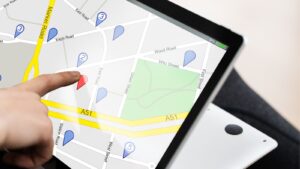In his paper, John McCarthy from Stanford University defines artificial intelligence (AI) as the “science and engineering of making intelligent machines, especially intelligent computer programs”. In other words, it is a virtual replica of what acts as the human brain digitally. The key quality of AI is its ability to self-learn and take the best action to solve a specific problem, thereby holding human-like capabilities such as problem-solving and decision-making. Recently, AI has been closely associated with machine learning and deep learning capabilities in addition to big data, and this infusion has empowered AI to be more advanced than ever. It is used in many industries, including medicine, manufacturing, finances and science, exponentially reducing humans’ need to intervene. While this has led to many positive outcomes, it has also garnered negative fears. This article will provide an overview of what AI is and how it is expected to impact society.
Five Ways AI is Impacting Society in the Future
While AI is expected to be integrated into a range of services in the future as a form of software, the potential AI has to change society is enormous. Experts hope such impacts will mostly be positive, but this does not mean AI is all good. It could be a threat to certain professions, such as the artist community or dangerous in some other aspects, as data privacy could be invaded. Scientists at the University of Oxford have stated that AI will be able to translate languages by 2024, write school essays by 2026, sell goods by 2031, write a bestselling book by 2049, and conduct surgeries by 2053 without the help of humans. Here are five ways experts predict will change the future:
Transportation
The Society of Automotive Engineers (SAE) has introduced six vehicle driving automation systems levels. The transportation industry is currently at level two with companies like Tesla and General Motors that can control steering, acceleration, and braking. Despite being able to implement an automation system, the companies still require steering wheels and drivers to remain engaged.
While such automobiles have helped ensure a safe driverless experience, this is only limited to cars. In the future, the world can expect to see autonomous buses, trucks, motorcycles and other types of vehicles. While level two automobiles will have a driver sitting, AI aims to ensure that they operate the vehicle legally and safely. The speed at which a person is driving, their end destination, and the distance between other vehicles are some ways AI ensures the transportation sector remains efficient. The future, however, holds the potential to achieve level six – when driverless cars become a complete reality, not requiring any human assistance. Automated license plate recognition (ALPR) is one way experts predict AI will further help in the advancement of transportation. Drones technology is also meant to drive urban transportation change whereby floating warehouses deliver packages supported by pick-up centres.
Healthcare
When it comes to healthcare, patients must depend significantly on their doctors to give them the most life-sustaining advice. Hence, based on the doctor’s confidence and experience, patients sometimes need to make decisions without knowing about the alternative options. AI is expected to process the ample data the healthcare system holds to find the best approach in the future. Whether it is an invasive or traditional approach, the system can assess the most suitable level of treatment according to each patient. As iterated by Deloitte, AI will, in other words, pave the way for more personalised treatment. As many of these will be data-driven insights, the probability of being completely cured is information that would otherwise never have been available.
Experts also predict that by at least 2065, AI will offer ways to modify the genomes of humans, allowing human DNA to be edited. This will allow patients to be treated solely on their sequence genome. This also means the ability to make a person more athletic or musical can be manually done before birth. While the world already has genetically edited babies, by 2050, experts predict this will be more common. AI is moreover expected to lead in finding a cure for neurological diseases like Alzheimer’s and other physical defects such as blindness and deafness. AI will also further strengthen prosthetics, allowing them to function almost as a natural limb or even better.
Space Exploration
NASA has already used AI for some time, although it is primarily used for out-of-space operations. It is specifically used to send unmanned shuttles, rovers, and probes to explore other planets and galaxies. This has allowed unknown territories in space to be explored without humans. AI robots take snapshots and provide real-time data without needing any organisation to put people at risk. The assistance AI can provide to space exploration will be even more significant. As the threat of climate change has led space exploration centred on finding another viable planet, AI is expected to provide more clarity and control in this sphere.
AI will extend its scope of assistance to other stages and operations involved in space exploration, including the mission planning, execution and completion stages. AI is also predicted to help scientists take preventive measures against catastrophes, even like a meteor or spacecraft falling. One of the exciting projects AI is meant to help in space is exploring the sun’s atmospheric corona through NASA’s Parket Solar Probe, expected o to be launched in December 2024. It is also expected to help astronauts in mission designing and planning, whereby AI can detail all the possible things one can experience in space.
Quantum Computing
Quantum computing offers a different way of seeing the world. Both quantum mechanics and AI are required to work together to process complex processors. They are proven to provide better speeds and offer more accurate insights. It is a valuable asset in the pharmaceutical industry and in training vehicles in the autonomous sector. It is also one of the most influential digital technologies that can crack through many defences that secure the internet. In this respect, a business that wields this power is considered dangerous as it poses a severe threat to cyber security.
Quantum computing has also helped AI to understand more than one language. Hence, while only one language is understood, quantum computing assists AI models in breaking through language barriers. This means applications such as google translations, the number of languages that can now be translated in applications, will increase. Currently, Google only offers translations to 25 out of the 7000 languages in the world. In a recent initiative to provide more inclusivity, Google announced that 200 other languages were to be added. This indicates that one can expect to see a platform that offers content in many languages.
Banking and Finance
While AI is already integrated into the banking and finance sector to detect fraud, provide a personalised experience to customers and streamline day-to-day transactions, AI can unlock far more benefits. AI will act as each consumer’s specialised financial advisor in the foreseeable future. With access to the respective individual’s sensitive information, AI can assess the consumer’s spending habits and predict their financial status. Based on such information, AI will be able to provide reliable advice. This also extends to banking institutions, whereby AI can assist financial institutions, identify new revenue streams, and make lending decisions. Hence, consumers can receive faster updates on the progress of their application for a loan, for instance. This would further strengthen banks against cases of fraud.
While a reasonable concern in AI and banking and finance is privacy, the industries are currently looking into how more effective protocols can be implemented. It is, however, clear that AI has a double role as a protector and a threat to security. As a protector, it will enhance how it can eliminate fraud and scams. By quickly analysing all the extensive documents, AI can categorise them according to their trustworthiness. Hence, banks can eliminate time wasted on such useless cases and, most importantly, reduce the risk of losing money.
Not Everyone Sees AI Offering A Bright Future
People negatively perceive AI not because of how it is presented in fictional movies and novels. It is also because the scientific community has stated it. For instance, the danger of using AI has been warned about by the late theoretical physicist Stephen Hawking and Elon Musk at present. Hawking often says that “machines whose intelligence exceeds ours” are dangerous, while Elon Musk believes AI is humanity’s biggest existential threat. What this highlights is that AI should be carefully used and that it needs to be regulated. Without such legal regulations, there could be space for AI to be used for the wrong reasons or achieve a public benefit by using an inappropriate or unethical method. It is not a technology that certain professionals appreciate, as artists and writers often find their skills replaceable with AI-generated painting becoming a trend. Such professionals argue that AI has led others to undermine their fields on the assumption that they do not require human skill or talent.
Investigating AI’s Hidden Potential
The real potential of AI is yet to be seen. While AI has been in operation for a long time, we experience giant leaps through AI solutions every decade or century. This means humans have yet to experience the full advantages of such a technology incorporated into a respective field. Will it replace humans and proceed in its own advancement, or can we control the implications AI has in society?







